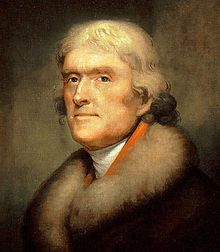Thomas Jefferson

“He is wise without formality, and maintains a consequence without pomp or distance.” (1793, Benjamin Rush)
“I do now know him to be one of the most artful, intriguing, industrious and double-faced politicians in all America.” (1798, John Nicholas)
Biographical Information (pdf)
Descriptions of Thomas Jefferson:
John Adams, Diary - October 25, 1775
Duane says that Jefferson is the greatest Rubber off of Dust that he has met with, that he has learned French, Italian, Spanish and wants to learn German.
Jacob Rubsamen to Unknown - December 1, 1780
Edmund Randolph to James Madison - September 20, 1782
Mrs. Jefferson has at last shaken off her tormenting pains by yielding to them,* and has left our friend inconsolable. I ever thought him to rank domestic happiness in the first class of the chief good; but I scarcely supposed, that his grief would be so violent, as to justify the circulating report, of his swooning away, whenever he sees his children.
*Martha Jefferson died on September 6, 1782.
Thomas Jefferson to Abigail Adams - September 25, 1785
I do not love difficulties. I am fond of quiet, willing to do my duty, but irritable by slander and apt to be forced by it to abandon my post. These are weaknesses from which reason and your counsels will preserve Mr. Adams.
Oliver Wolcott Jr. to Oliver Wolcott Sr. - February 14, 1792
Mr. J. appears to have shown rather too much of a disposition to cultivate vulgar prejudice; accordingly he will become popular in ale houses, and will do much mischief to his country by exciting apprehensions that the government will operate unfavorably.
Benjamin Rush, Commonplace Book - August 22, 1793
John Nicholas to George Washington - February 22, 1798
I do now know him to be one of the most artful, intriguing, industrious and double-faced politicians in all America.
John Marshall to Alexander Hamilton - January 1, 1801
I received this morning your letter of the 26th of December. It is I believe certain that Jefferson & Burr will come to the house of representatives with equal votes. The returns have been all received & this is the general opinion.
Being no longer in the house of representatives & consequently compelled by no duty to decide between them, my own mind had scarcely determined to which of these gentlemen the preference was due. To Mr. Jefferson whose political character is better known than that of Mr. Burr, I have felt almost insuperable objections. His foreign prejudices seem to me totally to unfit him for the chief magistracy of a nation which cannot indulge those prejudices without sustaining debt & permanent injury. I addition to this solid & immovable objection Mr. Jefferson appears to me to be a man who will embody himself with the house of representatives. By weakening the office of President he will increase his personal power. He will diminish his responsibility, sap the fundamental principles of the government & become the leader of that party which is about to constitute the majority of the legislature. The morals of the Author of the letter to Mazzei cannot be pure.
Theodore Sedgwick to Rufus King - May 24, 1801
Jefferson was believed to be a sincere Democrat—hostile to the principles of our Constitution, and the measures of the administration—desirous of conforming in practice to the imbecile principles of the old confederation, a confederation whose measures would be directed by the arrogance of Virginia aided by those states which looked up to her with servile submission. It was believed that he had given evidence of an entire devotion to France under every form of her government, and that under the dominion of this political passion, aided by a rancorous hatred to Great Britain, he might involve the country in war with the latter, & what is worse form an intimate and subordinate connection with the former.
Robert Troup to Rufus King - April 9, 1802
Jefferson is the supreme director of measures—he has no levee days—observes no ceremony—often sees company in an undress, sometimes with his slippers on—always accessible to, and very familiar with, the sovereign people.
Thomas Jefferson to John Adams - January 21, 1812
You and I have been wonderfully spared, and myself with remarkable health, and a considerable activity of body and mind. I am on horseback 3 or 4 hours of every day; visit 3 or 4 times a year a possession I have 90 miles distant [Poplar Forest], performing the winter journey on horseback. I walk little however; a single mile being too much for me; and I live in the midst of my grandchildren, one of whom has lately promoted me to be a great grandfather.
Benjamin Rush to John Adams - February 17, 1812
I rejoice in the correspondence which has taken place between you and your old friend Mr. Jefferson. I consider you and him as the North and South Poles of the American Revolution. Some talked, some wrote, and some fought to promote and establish it, but you and Mr. Jefferson thought for us all.


